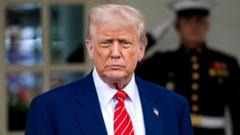A group of Democratic senators have publicly denounced the U.S. administration's lackluster response to the recent earthquake in Myanmar, highlighting its failure in providing necessary humanitarian aid.
Senators Criticize U.S. Aid Response to Myanmar Earthquake

Senators Criticize U.S. Aid Response to Myanmar Earthquake
Democratic lawmakers express concern over perceived inadequacies in U.S. humanitarian assistance as rival nations step in.
Democratic senators have voiced strong criticism of the Trump administration over its response to a devastating earthquake in Myanmar that has resulted in significant loss of life. In a letter released on Wednesday, the lawmakers argue that the administration's limited assistance efforts fall far short of what is needed, particularly as countries like China and Russia actively send in rescue and relief teams.
The earthquake, which occurred on Friday, has reportedly claimed the lives of more than 2,700 individuals, with buildings crumbling across Myanmar and nearby Thailand. The military junta in Myanmar has sought international help following the disaster. In contrast to the relatively sparse U.S. response, neighboring countries including China, Russia, India, Thailand, Malaysia, and Vietnam have quickly mobilized teams and supplies to provide assistance.
The letter, coordinated by Senator Chris Coons of Delaware, targets key figures within the administration, including Secretary of State Marco Rubio and Treasury Secretary Scott Bessent. Senators expressed their deep concerns that the nation's failure to adequately respond sends a troubling message internationally, suggesting that adversarial nations present themselves as more reliable sources of support.
The U.S. government has not dispatched any specialized aid teams to support relief efforts in Myanmar. The senators argue that the administration should consider granting sanctions waivers specifically for earthquake relief efforts directed into the beleaguered country. They emphasize that this situation represents a critical moment for the U.S. to demonstrate its commitment to humanitarian objectives and to counteract the perception of diminished U.S. credibility on the global stage.






















